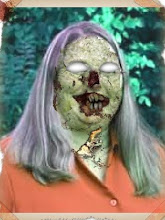Source: che11eness at http://www.budget101.com/
The History of Halloween Halloween is a modern name that was derived from All Hallow's Eve. According to the history of Halloween, the actual festival was called Samhain (pronounced sow-in) and mark the end of the harvest season after the live stock had been brought in and to signal the beginning of the winter season.It was a festival celebrated by the Celtic Druids which was celebrated on October 31st. This was the end of their year and November 1st was the beginning of the New Year, unlike today where our year ends on December 31st and the new year begins January 1st.Samhain (The Festival of the Dead) was observed in England, Scotland, Wales and Ireland. As evening drew near, they began preparations for the Vigil of Samhain (The Lord of Darkness). It was believed that the veil between the living world and the spirit world was at its thinnest, and that the spirits of the people who had died in the past yearcould cross over and walk the earth once more. Communication with dead kinsmen was also believed to be possible at this time, and that all magical powers were enhanced greatly.The people would douse the fires in their homes, for they believed that evil spirits might find their way in and possess the living. Outside, great bonfires were started by the Druids (bonfire = bone + fire). Now there is great debate of whether they sacrificed humans or not during this celebration. Some say sick animals that wouldn't survive the winter and criminals…believed to be possessed by evil spirits… were burned. Once the fires died down, the Druids would read the bones and ashes left over to divine how the coming year would be. Others say that there is no basis in fact for this ritual. This is one of the mysteries in the history of Halloween that we may never know for sure.The people of the land would light torches from the fire and in turn, would re-light their own hearth fires. The belief was that the fire from the sacred bonfire would keep the evil spirits away, while allowing the spirits of their kinsfolk to find their way home.People would also dress up in furs and scary masks a prelude to our dressing up in costumes. They hoped that the evil spirits would be scared away or would mistake them for animals and wouldn't try to possess their bodies.Another tradition was for the peasants to go door to door, begging for food. The food would be left out to appease the spirits, speeding them on their way back to the spirit world. Whoever gave food would be assured of receiving a prayer from the peasants for good fortunes for the coming year. Those that were stingy received eggs and rocks thrown at their homes, among other pranks. We can see where some of our traditions came from, can't we?According to the history of Halloween, this was also the beginning of the New Year as well, and many activities involving predictions also took place, aside from the bone reading of the Druids. This was a time when fortune telling, tealeaf readings and other divination methods would be the most powerful for the future. One of the fun celebrations we still uphold is bobbing for apples. The Celts believed that the first person to bite an apple would be the first to marry.Another tradition was to peel an apple from top to bottom. The person with the longest unbroken peel would be assured the longest life. If you threw the apple peel over your shoulder, the initial it forms upon landing is the initial of your future mate.In the 7th century, the Romans conquered England and brought many of their own traditions. One of these was the celebration of All Saints Day, which was originally celebrated in May. By the 9th century, All Saints Day was moved to November 1st and All Soul's Day (a festival to celebrate all the dead souls) was added to November 2nd. The Catholic Church hoped that by combining the pagan celebration of Samhain with their own festival they could convert more people to follow the Christine religion. At this point, Samhain became known as All Hallow's Eve (the eve before the hallowed days of All Saint's Day and All Soul's Day). Eventually, All Hallow's Eve was shortened to Hallow E'en and then to Halloween, as we know it today.
16 years ago



No comments:
Post a Comment